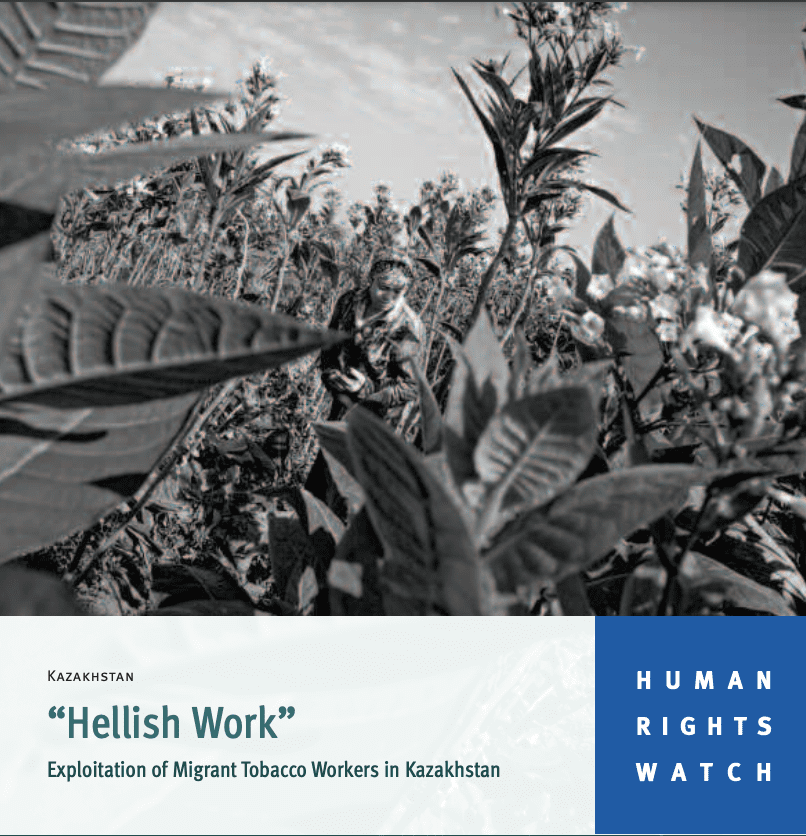
“Hellish Work” Exploitation of Migrant Tobacco Workers in Kazakhstan
Summary
Every year, tens of thousands of migrant workers from Kyrgyzstan travel to the Central Asian economic powerhouse of Kazakhstan in search of employment. Thousands of these migrant workers, often together with their children, find work in tobacco farming. Human Rights Watch research in 2009 documented abuse and exploitation of many migrant workers by tobacco farm owners who employ them for seasonal work. Tobacco farm owners in Kazakhstan contract with and supply tobacco to Philip Morris Kazakhstan (PMK), a subsidiary of Philip Morris International (PMI), one of the world’s largest tobacco companies.
Human Rights Watch interviewed 68 migrant tobacco workers in 2009 and early 2010 who were working or who had recently worked on tobacco farms in Kazakhstan. They variously told Human Rights Watch how some employers confiscated their passports, failed to provide them with written employment contracts, did not pay regular wages, cheated them of earnings, and forced them to work excessively long hours. Some employers also failed to provide migrant workers with potable water, adequate hand-washing and other sanitary facilities, or adequate living conditions.
In the worst cases, workers were subjected to forced labor, or situations analogous to forced labor, in which employers confiscated migrant workers’ passports and in some cases required them to perform other work without pay or compensation in addition to tobacco farming. Work extracted under menace of penalty and for which a person has not offered him or herself voluntarily is forced labor and is banned under both international and Kazakhstani law.
Human Rights Watch documented 72 cases of children working in tobacco farming in 2009, the youngest of whom was 10. At that time, the structure of tobacco farming, whereby workers were paid only once at the end of a season based on the volume of tobacco produced, contributes to parents relying on children to participate in the work. International and Kazakhstani law prohibits the employment of children under the age of eighteen in harmful or hazardous work; Kazakhstani law explicitly prohibits employment of children in tobacco farming. Owing to the difficulty of the work and the risks associated with the handling of tobacco leaves and exposure to pesticides, experts agree that tobacco farming is one of the worst forms of child labor, or labor from which children under 18 are categorically prohibited.
Children who worked with their families on tobacco farms typically missed several months of school each year, or even entire academic years. Although very often parents expected their children to work with them, in some cases this was because migrant children faced obstacles in accessing local schools in Kazakhstan. International law guarantees the right to primary education, including for migrant workers.
Although Kazakhstani workers employed in tobacco may face many of the same abuses documented here, Human Rights Watch is focusing on migrant workers in this report because they are particularly vulnerable to abuse. In the absence of legal residency and employment status, they are less able or willing to seek redress through government agencies or the courts. Migrant workers are also typically very poor, mostly do not speak Kazakh, and are living in remote areas, far from governmental or nongovernmental services.
Under international human rights law, Kazakhstan has the obligation to protect all individuals in its territory, regardless of migration or employment status, from abuses, including by private actors. But in most cases the government of Kazakhstan has not fulfilled its obligations in its treatment of migrant workers: it has neither provided sufficient legal protections nor made existing protections effective.
International human rights treaties and other instruments pay particular attention to the duty of states to uphold equal and inalienable rights. However, the basic principle that companies also have a responsibility to respect human rights, including workers’ rights, has achieved wide international recognition, as evidenced by numerous instruments, initiatives, guidelines and declarations, as well as in case law.
In line with these principles, companies are expected to have policies and procedures in place to ensure human rights are respected and not abused, to undertake adequate due diligence to identify and effectively mitigate human rights problems, and to adequately respond in cases where problems arise.
PMK is the sole purchaser of tobacco in the Enbekshikazakh district of Almaty province, the main tobacco farming area of Kazakhstan. As a subsidiary of PMI, both PMK and PMI have responsibilities under international human rights principles and obligations under Kazakhstani law to ensure the protection of those producing tobacco to be used in PMK and PMI products.
PMI has developed a Good Agricultural Practices (GAP) policy related to various aspects of tobacco farming, including the prohibition on child and forced labor, workplace safety, and safe use of pesticides. However, on the basis of its research Human Rights Watch believes that the GAP program has not proved adequate to address the range of abuses and exploitative practices in tobacco farming in Kazakhstan documented in this report. In the course of research for this report Philip Morris International and Human Rights Watch maintained a dialogue through meetings and letters, and PMI and PMK committed to taking measures to address the abuses and exploitative practices documented by Human Rights Watch. These are outlined more fully in the relevant chapters of this report.
Read more here.
